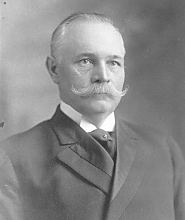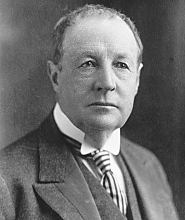
Senator William Alden Smith (R - Michigan), who had sailed with Captain Smith in 1906 and had a chance to meet the man, wanted to know why this ship went down. He telephoned to Charles Hilles, Secretary to President Taft, to ask what action was to be taken. The reply was that the President intended to do nothing. On Tuesday morning, the 16th, he sat down and began typing out a draft.
The following morning, word had been received showing that there were no other survivors of the disaster, apart from those on board the Carpathia. The true scope of the disaster was now completely known to all. As the Senate met that morning the floor was turned over to Senator Smith, who immediately asked for passage of his resolution which authorized the Committee on Commerce to investigate the disaster. The resolution called for a hearing with witnesses being subpoenaed who could offer information about the disaster. With very little opposition the resolution was carried, and Smith was appointed by the Commerce Committee chairman, Knute Nelson, as chairman of the subcommittee to look into the Titanic disaster.
Neslon and Smith spent the remainder of the day selecting the panel of Senators that would aid him in the inquiry. In the end they selected an equal number of Republicans and Democrats. The members of the Subcommittee were:
 |
 |
 |
 |
 |
 |
 |
On Thursday the 18th, the Department of the Navy contacted Senator Smith, advising him that they had intercepted several significant messages sent by J. Bruce Ismay. These telegrams intimated that Ismay was hoping to go directly back to England, along with the crew, without setting foot on American soil. Smith immediately decided to press the issue and arranged a noon meeting at the White House.
During the meeting, Smith asked about the legalities of subpoenaing British citizens. Taft, after checking with Attorney-General George Wickersham, said there was no question so long as they were in the United States.
That afternoon, the first meeting of the investigative subcommittee was held, during which the Ismay messages were discussed. Smith asked which of the other Senators would accompany him to New York to serve subpoenas and interrogate witnesses.
Bruce Ismay might have hoped for a quick return to England for himself and the surviving crew members, but that hope was quickly went away with the arrival of Senators William A. Smith (R-Michigan) and Francis G. Newlands (D- Nevada), accompanied by US Steamship Inspector General George Uhler, Sheriff Joe Bayliss, of Chippewa County, Michigan, (Bayliss, an old ally of Smith's, was deputized as an Assistant Sergeant at Arms of the US Senate specifically to serve subpoenas), and Bill McKinstry (Smith's private secretary). The men carried subpoenas for Ismay, as well as various members of the Titanic crew.
Wanting to take no chances that key witnesses might leave the area and not be open to subpoena the hearings were opened the following morning at the Waldorf-Astoria Hotel in New York City. The first witness called to testify was Mr. Ismay.
Over the course of 18 days of inquiry the testimony of 86 witnesses was entered for the record. The inquiry transcript is over 1,000 pages long. It is presented, in its entirety, on the following pages.